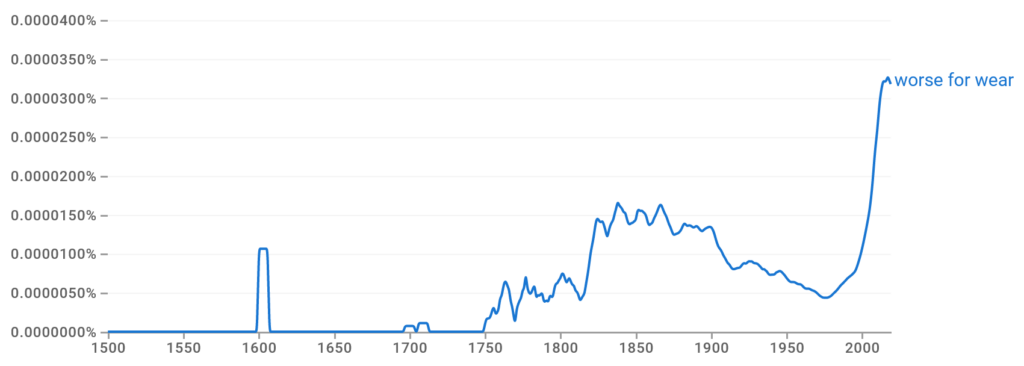Worse for wear typically means showing signs of wear, damage, or fatigue. This can be applied to both living and inanimate things. It’s a phrase we often use to describe someone or something that looks run-down or diminished, usually due to overuse or strain.
Idiomatic expressions like worse for wear are phrases that mean figuratively, and they’re essential because they provide us with ways to communicate big ideas and emotions and help us remember lessons learned throughout history.
But I always say that an idiom is only effective when used correctly. So, my guide covers details about the true meaning and usage of the phrase, explores its origin and etymology, provides variations and alternatives, and pulls some real-life examples of the idiom in use. Ready to learn how to use the phrase worse for wear?

What Does the Idiom Worse for Wear Mean?
The idiom worse for wear is used to describe something or someone in a poor or deteriorated condition, often due to wear, damage, or prolonged use.
Cambridge Dictionary defines the idiom worse for wear as “tired or in poor condition because of a lot of work or use.” Moreover, Merriam-Webster defines it as “in worse condition after doing or experiencing something.”
So, basically, it refers to being in a state of deterioration or fatigue. However, this can be due to a specific event or a broader experience. It implies that someone or something has seen better days and is now showing the effects of wear or hardship.
My mind immediately goes to parenting. I’m a mother of two pre-teens, and there’s no denying that I look worse for wear pretty much every day. I always thought that the mombie exhaustion would go away after they grew up and could be more independent, but you just replace one stress with another as they grow older.
Is It Worse for Wear or Ware?
Homophones really confuse things, don’t they? Wear and ware sound exactly the same, but when writing this idiom, the correct spelling is wear. Ware means merchandise, so it doesn’t fit this expression’s meaning.
Literal Meaning vs. Figurative Meaning
The literal meaning of worse for wear is pretty close to its figurative meaning—that an object has become worn out over time. But using it figuratively, it extends to people feeling tired, worn down, or less than their best due to whatever life experiences or challenges plague them.
Variations of the Idiom
These variations, although slightly different, still suggest that despite potential challenges or hardships, the person or object hasn’t been significantly affected or damaged.
- None the worse for wear
- No worse for wear
- No worse for the wear
How Is Worse for Wear Commonly Used in Context?
The expression worse for wear serves as a vivid descriptor for items or individuals that have endured wear, damage, or the passage of time.
In the following sections, we explore the diverse applications of this idiom, examining different ways it is commonly used, offering tips for its effective usage, and providing illustrative examples to showcase its contextual nuances.
What Are the Different Ways to Use Worse for Wear?
- After a challenging experience: This can be applied to any degree of difficulty. For instance, “My father definitely looked worse for wear after running his first marathon.”
- Describing worn-out objects: They can be worn from use or just aged. For instance, “Grandma’s old chair in the living room is a bit worse for wear. We should reupholster it.”
- To let others know how you’re feeling: Applies whether it’s visible or not. For instance, “After pulling all-nighters for the last two weeks, I’m done with my manuscript. But I definitely feel worse for wear.”
What Are Some Tips for Using Worse for Wear Effectively?
- Use it to describe someone’s appearance or state after they’ve been through a challenging situation.
- It can be a tactful way to note that something has declined in quality or appearance without being overly critical.
- In conversation, this phrase can show empathy or understanding towards someone’s difficulties.
- Avoid using the phrase in situations that might make the person feel ashamed, like a mother of a newborn who hasn’t slept or showered in days.
Where Can You Find Examples of Worse for Wear?
This idiom is so common that it pops up in literature, everyday conversations, and all sorts of media to describe fatigue or decline.
There’s an episode from one of my favorite TV shows, The 100, where so many horrible things happen to the characters that you truly think they’ll never recover from it all. You can find it in season three, episode nine, and there’s a great article that recaps the events titled Worse for Wear. Trust me, it’s aptly named. That was such a brutal episode; the characters went through hell.
The media has used the phrase in various reports over the years. Here are a few examples:
It’s well-known around the state that a number of rural schools are a little worse for wear, having faced the harsh elements head-on for many years, in some cases. (The Arctic Sounder)
To the collective relief of all of Brazil, Neymar looked none the worse for wear despite the host’s bruising play. (The Rio Times)
What Is the Origin of the Idiom Worse for Wear?

The idiom worse for wear originated from 1546 in A Dialogue Conteinyng the Nomber in Effect of all the Prouerbes in the Englishe Tongue by John Heywood: “Al thyng is the wors for the wearyng.” This translates to “as things are used they deteriorate.” But it only rose in popularity sometime in the 1800s.
How Did the Idiom Evolve Over Time?
The phrase has been a part of the English language for a long time, evolving in its usage over the years. Initially used to describe physical objects showing signs of wear, the idiom has come to include the human condition of feeling tired or run-down.
What Are Some Related Terms to Worse for Wear?
Worse for wear works in formal and informal situations, but sometimes it doesn’t always fit the context or mood. So, try one of these synonyms instead! Antonyms work great if you want to express the totally opposite idea.

Synonyms
- Run-down
- Fatigued
- Weathered
- No spring chicken
- Exhausted
- Weary
- Beat out
- Beat down
- Wiped out
Antonyms
- Fresh as a daisy
- In mint condition
- Good as new
- Like new
Worse for Wear: Test Your Knowledge!
Choose the correct answer.
What Have We Learned About Worse for Wear?
Worse for wear is one of those idioms that succinctly captures the state of being affected by time, use, or experience. It’s a way to describe life’s inevitable wear and tear, whether on objects or our own well-being.
Understanding this phrase helps us articulate the visible signs of life’s challenges, fostering empathy and awareness of the toll various experiences can take. I hope my breakdown of its meaning, origin, variations, and examples have helped make that clearer for you.
Check out more idiomatic expressions on our site and learn how you can use them!
